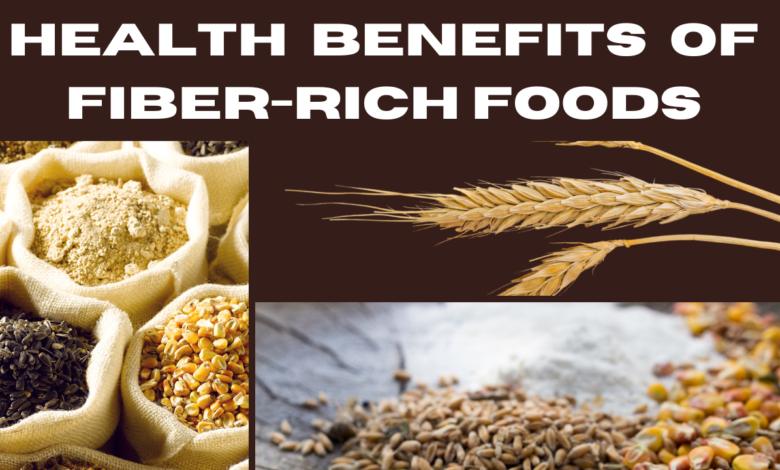
Incorporating fiber-rich foods into your daily diet is essential for maintaining optimal health. Dietary fiber, found primarily in fruits, vegetables, whole grains, and legumes, is best known for its ability to prevent or relieve constipation. However, fiber can provide other health benefits as well, such as helping to maintain a healthy weight and lowering your risk of diabetes, heart disease, and some types of cancer. Here’s an in-depth look at the benefits of fiber-rich foods and why you should make them a staple in your diet.
Table of Contents
1. Improves Digestive Health
One of the most well-known benefits of dietary fiber is its ability to keep the digestive system running smoothly. Fiber adds bulk to the stool and helps food pass more easily through the digestive tract. This can prevent constipation and promote regular bowel movements. Soluble fiber, found in foods like oats, apples, and beans, absorbs water and forms a gel-like consistency, which can help soften stool. Insoluble fiber, found in whole grains and vegetables, adds bulk to the stool and aids in quicker passage through the intestines.
2. Helps Control Blood Sugar Levels
Fiber can help regulate the body’s use of sugars, helping to keep hunger and blood sugar in check. Soluble fiber, in particular, can slow the absorption of sugar and help improve blood sugar levels, which is beneficial for people with diabetes. A diet high in fiber has been linked to a reduced risk of developing type 2 diabetes.
3. Aids in Weight Management
Fiber-rich foods can aid in weight management by making you feel fuller for longer. This is because high-fiber foods are more filling than low-fiber foods, meaning you’re likely to eat less and stay satisfied longer. They also tend to be lower in calories for the same volume of food. The bulk that fiber provides can help to curb overeating and reduce calorie intake, making it easier to maintain a healthy weight.
4. Lowers Cholesterol Levels
Soluble fiber found in beans, oats, flaxseed, and oat bran can help lower total blood cholesterol levels by lowering low-density lipoprotein, or “bad,” cholesterol levels. Studies have shown that fiber may have other heart-health benefits, such as reducing blood pressure and inflammation. High-fiber foods tend to be heart-healthy foods, rich in essential nutrients like vitamins and minerals.
5. Reduces the Risk of Heart Disease
High dietary fiber intake is associated with a lower risk of developing heart disease. Fiber helps to lower cholesterol levels and improve blood pressure, both of which are risk factors for heart disease. Whole grains and legumes, in particular, are known to support heart health due to their high fiber content and other beneficial nutrients.
6. Supports Gut Health
A diet rich in fiber can promote a healthy gut microbiome. Fiber acts as a prebiotic, providing food for beneficial gut bacteria. This can lead to a more balanced and diverse microbiome, which is essential for overall health. A healthy gut can improve immune function, reduce inflammation, and enhance nutrient absorption.
7. May Reduce the Risk of Certain Cancers
There is evidence to suggest that a high-fiber diet may help reduce the risk of developing certain types of cancer, including colorectal cancer. Fiber helps to promote regular bowel movements, which can help remove carcinogens from the body more quickly. Additionally, the fermentation of fiber in the colon produces short-chain fatty acids, which have protective effects against cancer.
8. Enhances Skin Health
Fiber, especially from psyllium husk, can help remove toxins from the body, improving skin health. It aids in the excretion of waste through the digestive tract rather than the skin, potentially reducing acne and other skin issues.
9. Provides Essential Nutrients
High-fiber foods are typically rich in essential nutrients like vitamins, minerals, and antioxidants. For example, fruits and vegetables are not only high in fiber but also provide important vitamins like vitamin C and potassium. Whole grains offer B vitamins and minerals such as iron and magnesium. Including a variety of fiber-rich foods in your diet ensures that you receive a broad spectrum of nutrients necessary for overall health.
10. Improves Longevity
A diet high in fiber has been linked to a longer lifespan. Studies have shown that individuals who consume a high-fiber diet have a lower risk of dying from any cause, including cardiovascular disease and all cancers. The various health benefits of fiber, from weight management to improved gut health, contribute to a healthier, longer life.
How to Incorporate More Fiber Into Your Diet
To enjoy the numerous benefits of fiber, aim to include a variety of fiber-rich foods in your daily meals. Here are some tips to help you get started:
Start Your Day with Whole Grains: Choose whole-grain cereals or oatmeal for breakfast.
Snack on Fruits and Vegetables: Keep fresh fruits and vegetables handy for quick snacks.
Add Beans and Legumes: Incorporate beans, lentils, and peas into soups, salads, and casseroles.
Opt for Whole Grain Products: Choose whole grain bread, pasta, and rice instead of refined versions.
Include Nuts and Seeds: Sprinkle nuts and seeds on salads, yogurt, or oatmeal for an added fiber boost.
Hydrate Well: Drink plenty of water to help fiber do its job effectively in your digestive system.
Also Read:10 Health Benefits of Eliminating Sugar for a Few Weeks
Conclusion
Incorporating fiber-rich foods into your daily diet can provide a myriad of health benefits, from improved digestion and weight management to enhanced heart health and reduced cancer risk. By making small, consistent changes to include more fiber in your meals, you can significantly improve your overall well-being and enjoy a healthier, more balanced life.




